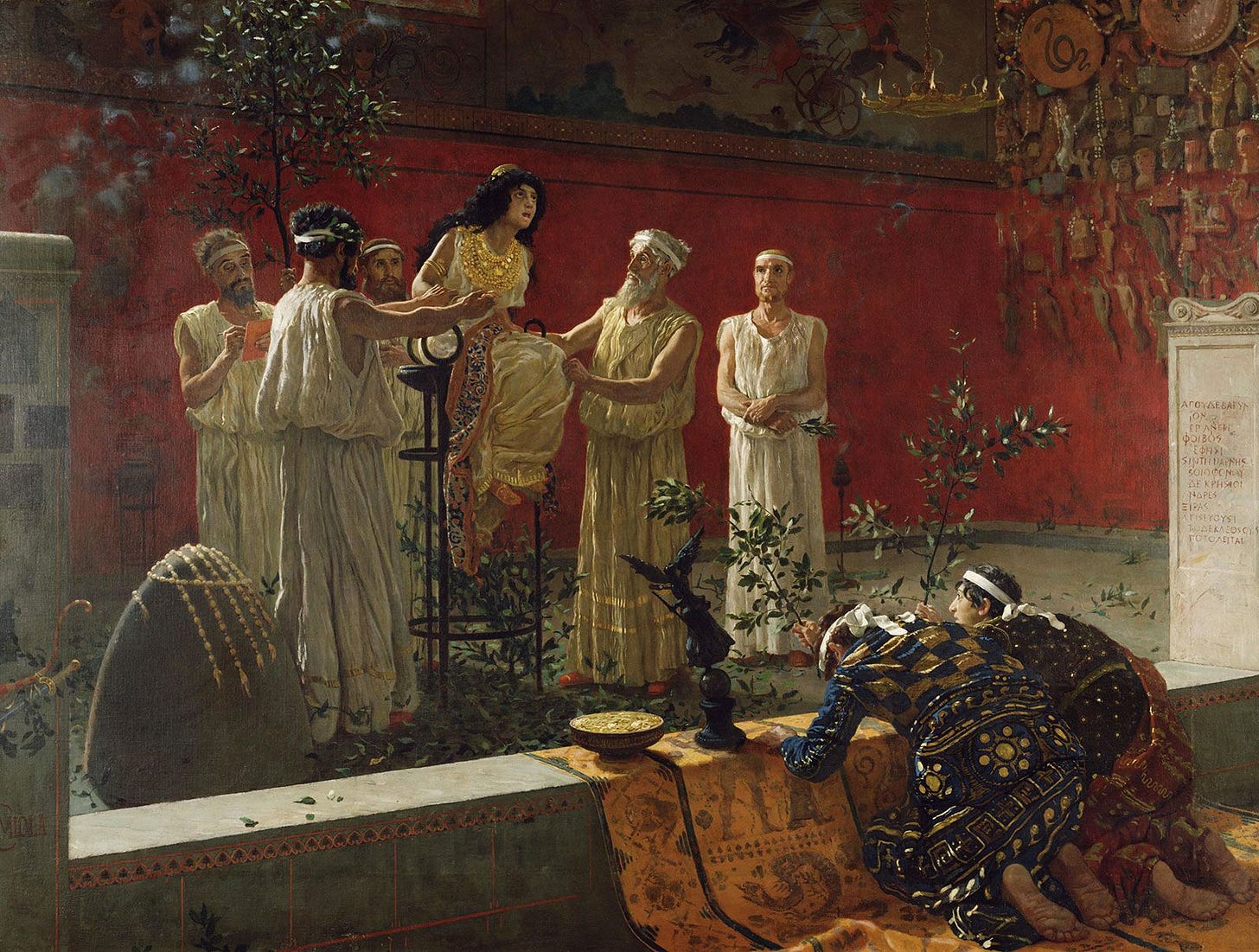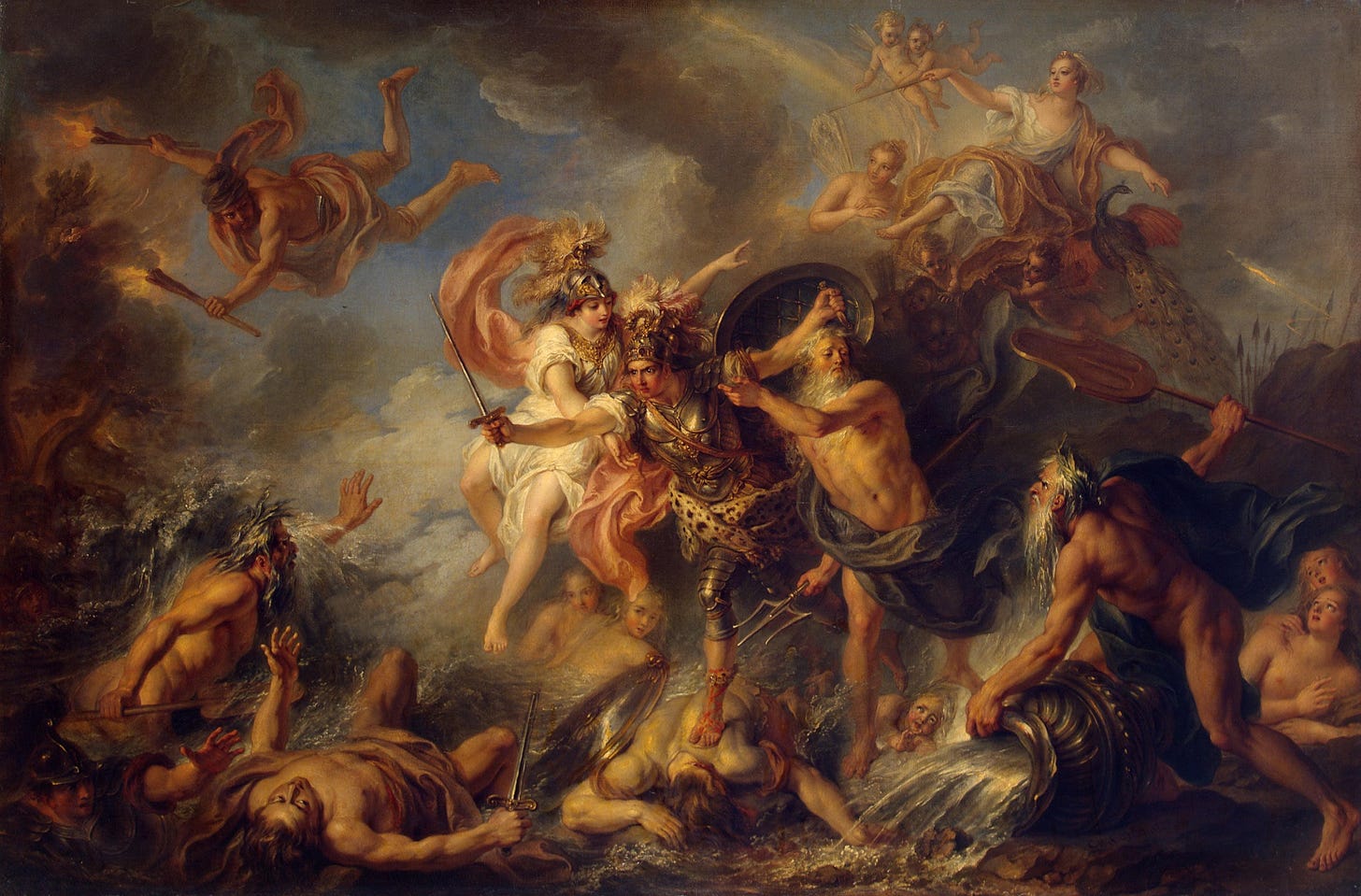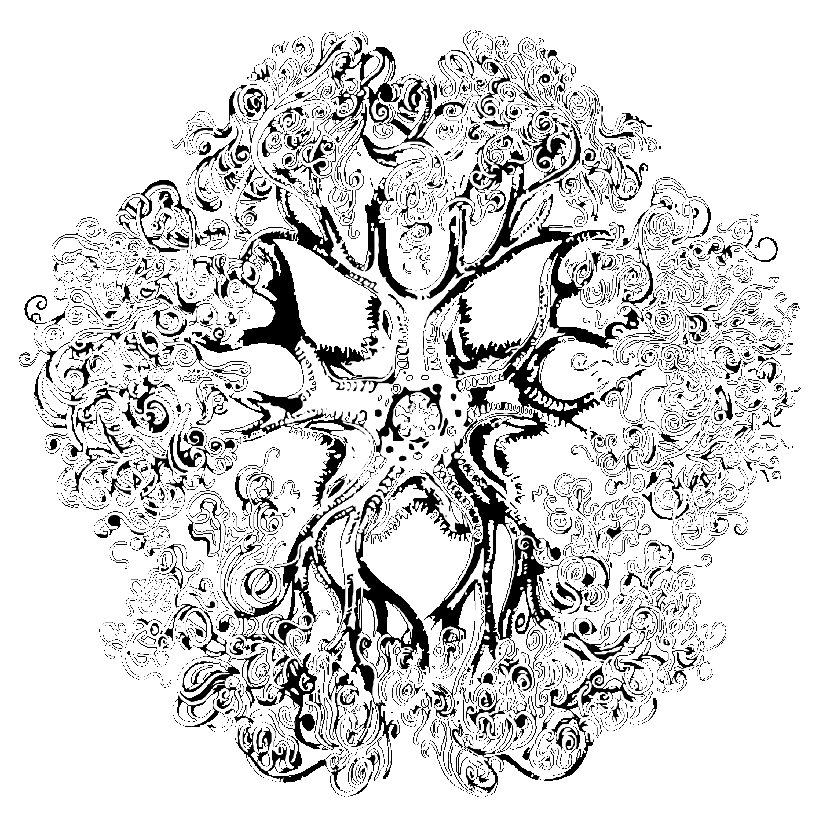All those lovely blossoms now are gone,
Scatter'd by the North-wind's piercing breath;
To enrich, amongst the whole, but ONE,
All this God-like world was doom'd to death.
Sadly turn I to the stars on high-
Thou, Selene, canst not there be found!
Through the forest, through the waves I cry-
Ah, they echo back no sound!
- Schiller, The Gods of Greece
In the twilight of the Classical, the Greeks were commenting on a profoundly grave problem within their cities: their Oracles were going silent. Gone were the days when tyrants and kings depended utterly on their divinations, no longer did the intoxicated Pythonesses translate the words of gods into the iambic hexameter of Homer and Virgil. What little authority, what little meaning, could be derived from such rituals became increasingly base, and increasingly useless. The cornerstone of the religion of their ancestors was in visible decay. According to legend, the last prophecy given by Delphi was to Julian, the last pagan emperor of Rome, in 362CE. The oracle replied to an assistant of Julian's offer of aid to the temple with the following:
Tell the emperor that my hall has fallen to the ground. Phoibos no longer has his house, nor his mantic bay, nor his prophetic spring; the water has dried up.
Despite a long-standing (and easily disprovable) legend in Christendom that the resurrection of Christ is what shut off man's access to the gods, this was in reality a long decline, a creeping death that inched slowly towards its end over the course of hundreds of years. Plutarch, writing in his On the Decline of Oracles, presented a dialogue in an effort to explain what had happened to the oracles in the centuries before him. One man shrugs off the decline, pinning it on mere population decline and a lack of demand, but is swiftly rebuked by a mention of other well-respected oracles in distant, low-populated islands. Another presents the common explanation, that they have angered the gods; but no one really believes this, and as one points out, the oracles were gifts from the gods and understood to be perpetual. Plutarch, speaking through the narrator Lamprias, then offers his explanation: the oracles, he suggests, are always situated at or near caves because these places are natural “exaltations of the Earth”, which connect certain gifted individuals to the cycles and processes of the world. It is from this intuitive understanding of how the world works that the Pythonesses gleaned their predictive powers from. Yet caves, like all other natural formations, can change over time. A river may change its course, a forest may sink into a bog, and a mountain may erode. In this case, the caves had simply changed too much since the times of their origination, and the prophetic wells had gone dry.

Plutarch’s assertion is interesting for a number of reasons. For starters, he was probably correct in a way—one modern hypothesis for Delphi’s decline is the gradual waning of the cave’s hallucinogenic gasses. Secondly, his explanation is evidently material, involving no gods, “daimons”, or supernatural will. On this latter fact, he accurately accuses himself of impiety in the dialogue through a rebuke of one Ammonius to Lamprias, stating:
I do not know how it happened, but a little time ago we yielded to logic in wresting here the prophetic art from the gods and transferring it merely to the demigods. But now it seems to me that we are thrusting out these very demigods, in their turn, and driving them away from the oracle and the tripod here, when we resolve the origin of prophecy, or rather its very being and power, into winds and vapours and exhalations. For these temperings and heatings and hardenings that have been spoken of serve only the more to withdraw repute from the gods[.]
Plutarch's reply, to a modern reader, is bizarrely prophetic. He defends his assertion, as if he were a modern Christian making a defense of evolutionary theory, on the basis of natural science merely describing the work of God:
"To sum up, then: while every form of creation has, as I say, two causes, the very earliest theological writers and poets chose to heed only the superior one, uttering over all things that come to pass this common generality: “Zeus the beginning, Zeus in the midst, and from Zeus comes all being;” but as yet they made no approach towards the compelling and natural causes. On the other hand the younger generation which followed them, and are called physicists or natural philosophers, reverse the procedure of the older school in their aberration from the beautiful and divine origin, and ascribe everything to bodies and their behaviour, to clashes, transmutations, and combinations. Hence the reasoning of both parties is deficient in what is essential to it, since one ignores or omits the intermediate and the agent, the other the source and the means.”
With this statement, we see something very interesting: Plutarch is providing, in the first century, an account of the final breakaway from the myth and mysticism of the Greece of Homer and the coming scholasticism of Western Christendom. Even though Plutarch was a follower of the Greek gods, he is here operating on an analysis between the Creator and his creation. Furthermore, he is doing so through an early form of scientific rationalism, comfortable in ascribing to the caves what was once given to the gods. Though he intended this as the perfectly written argument for his explanation of what happened to the oracles, Plutarch mistakenly gives the game away. The reason why Delphi was no longer important wasn't because of a landslide that shut off its hallucinogenic vents, but because of the worldview and reasoning of men like Plutarch himself, for it was by their own hands and minds that they became disillusioned of this component of religion. What Plutarch had accomplished was the disenchantment of the Oracles.
The use of the term disenchantment has become increasingly common in discussions of sociology and theology alike, first termed by Max Weber, himself inspired by the poetry of Friedrich Schiller. “The fate of our times is characterized by rationalization and intellectualization and, above all, by the disenchantment of the world”, he wrote in his 1920 Sociology of Religion. The German word used by both, entzauberung, can be retranslated into demystification or demagification, each used to speak of the same concept. Disenchantment refers to:
“[T]he historical process by which the natural world and all areas of human experience become experienced and understood as less mysterious; defined, at least in principle, as knowable, predictable and manipulable by humans; conquered by and incorporated into the interpretive schema of science and rational government. In a disenchanted world everything becomes understandable and tameable, even if not, for the moment, understood and tamed. Increasingly the world becomes human-centred and the universe—only apparently paradoxically—more impersonal.”
Disenchantment, Enchantment and Re-Enchantment: Max Weber at the Millennium, Richard Jenkins. MWS 1 (2000) 11-32
We should hone in on Jenkins’ use of the term human-centered, which above all else is the primary result of disenchantment. An enchanted world is one that, when we interact with it, reciprocates back to us in some “aware” manner. It is a world steered by ever-watching gods and beings, of ritual and augury, of the dark forests of the unknown that seemingly call and repulse. A disenchanted world, consequently, is one that is utterly oblivious to our existence, a world of silent forests, empty temples, and abandoned Oracles. A disenchanted world is therefore one where there is only Man: his people, his cities, and his technology. What remains are just unthinking, unimportant things. We inhabit a world which, in accordance to our understanding, is incapable of responding back to us in any real sense. Try as we may, we can enter no pacts with atoms, nor can we call upon the good favor of thermodynamics. There is us, and there is material. People care increasingly less for the window dressing surrounding the two.
For nearly two thousand years, the predominant view of nature within Western culture was a fundamentally anthropocentric one: man alone was granted the classification of imago Dei, with an immortal soul meant not for this world, but for Heaven. The created world, though described as “good”, was explicitly meant for the benefit of man. While we owe much of this to Christianity, the Greeks were toying with these concepts long before it came to dominate the West (as indicated by Plutarch’s proto-monotheism). This conception set us up for disenchantment in two ways. Firstly, it contained the complete and total revocation of animism: whatever the nature of divinity is—whoever God is, or if there are gods or not—they are not here, imbued within the streams, animals, and events of this Earth. Secondly (and by consequence), it promoted the sense that the world and all of its things are to be at-hand for man’s consumption and utility. The latter sentiment is not specific to the urban and industrial masses, and can be found discussed around campfires in the small hunting camps that dot the American landscape.
This is a stark departure from the understanding of ancient peoples. When Achilles split the Trojans into two—driving half their army into an open plain for slaughter—he was halted by the personification of the river Scamander, Xanthes, who accosted him for clogging this holy stream with dead. Xanthes attacked the Achaeans with his whirling waters, nearly drowning Achilles as he began to doubt the validity of his mother’s prophecy. He cried out to the gods, who came to his aid and quelled the river with fire. During the chaos, the routed Trojans managed to reach the walls of Troy and regroup. Today we would read this as a dramatic telling of an assault being hindered by the native terrain of its defenders, simple as that, but this was not the worldview of the Greeks. In their minds, Achilles was literally battling a river which had conscious objectives and interests of its own, seeking to defend the people of Troy against a foreign aggressor. The world was filled with such things, and man was but a participant in that great drama.
In our transition away from mythological & religious explanations for our lives and the world in favor of rationalist & scientific explanations, our sense of the world became less mystical and more mechanistic. Never have we been more capable of explaining the natural world, and therefore, never have we required less from religion. While we once had this sense of religion entailing a “childlike fascination with the world”, eventually the time came for mankind to grow up, and leave these toys behind. So were we led to believe. Paradoxically, the more we discovered and understood about the natural world, the less we became able to grasp our place within it. Never before has mankind utterly lacked a sense of meaning to the extent that we do today.
This all seems obvious, but besides the point from a secular perspective. We are increasing our knowledge of the world, and in direct correlation with that, shedding away our primitive superstitions. What’s the big deal? To be sure, it is not simply a matter of “believing” that the world is enchanted or not, it is a matter of fact. We are not here to advocate for falsehoods simply on the premise that they are beneficial to believe. Further, frequent readers of mine know that I am happy to give scientific materialism all of the room it needs, and that efforts to try and box it in around a bow of religious fundamentalism are almost universally abortive. Rationality and science is not some beast for us to slay, but a tautological fact of life; it is something for us to contend and deal with as much as our solar orbit and changing of the seasons. In the past, some individuals have taken the threat of science and rationalism to such a degree that they adopt a level of anti-intellectualism, primitivism, and/or Ludditism. An example of this sentiment can best be seen in the writings of D.H. Lawrence, who writes in his 1920 novel Women in Love: “I don’t want to be rational. I want to feel. I don’t want to think... I want to live." A similar thread can be seen in the poetry of Walt Whitman in his When I Heard the Learn’d Astronomer, where he scoffs at the instruments and tinkering of an astrologist, and rejects attempts to understand the world in favor of experiencing it:
When I heard the learn’d astronomer, When the proofs, the figures, were ranged in columns before me, When I was shown the charts and diagrams, to add, divide, and measure them, When I sitting heard the astronomer where he lectured with much applause in the lecture-room, How soon unaccountable I became tired and sick, Till rising and gliding out I wander’d off by myself, In the mystical moist night-air, and from time to time, Look’d up in perfect silence at the stars.
We arrive at an apparent contest between two concepts which we understand the world and discern truth with: rationality and experience. Rationality involves a objective, abstract, and quantitative description of the world, which seeks to remove experience from the equation as a sort of toxin. Experience involves an understanding of the world rooted in the world as it appears to a specific observer, embracing the subjective, qualitative, and personal dimensions of perception. From here, one can write for years on the philosophy of objective versus subjective truths, of phenomenology, empiricism, or existentialism, and of the metaphysical and historical origins of myth and rationalism respectively. I cannot cover these things in a comprehensive and timely manner here. Instead, I offer the following analogy:
When one speaks of the color red, is he referring to a wave of light with a wavelength between 620 and 750 nanometers, or is he talking about his perception of a quality of the strawberry he’s holding? When one talks of the Sun, is he referring to the gaseous hydrogen reactor which anchors our solar system, or is he speaking of the torch above him, terrorizing his day with scorching heat as he harvests his fields? In either scenario, they are of course the same thing described differently, yet the rationalist description of the phenomenon does not, cannot, fully capture the meaning of the experience of that phenomenon. So long as each method is clear about where its boundaries and limits of investigation lie, the conflict between these two methods of truth-inquiry is largely artificial. In fact, it is essential to utilize both in order to strive towards a complete understanding of the world: what the world is, and how we exist within it.
I suspect that, by now, many of us today can sympathize with the concerns of the Greeks of Plutarch’s time, and the yearning of Whitman or Lawrence to escape the citified existence of modernity. Religious institutions are suffering a crisis of relevance. New visions of reality are rapidly displacing traditional ones. Their ability to provide truth and meaning are looked over in favor of more direct, more material processes. Environmental degradation is occurring at an astonishing rate, which our access to the unhuman being increasingly lost. The concept of a public religion is increasingly lost to the atomization of a religious society, where first every man has his own God dwelling in the Church of his mind— and then not at all. As the dominion of man sprawls beyond its means, the less it believes in its own existence. In other words, we are experiencing a crisis of religiosity, and everyone seems quietly aware of the fact. I'm sure you can feel it, too. What are we to do?
As discussed prior, attempting to silo off and ignore scientific and rationalist discovery is not an option: you will lose this battle. It is not a matter of believing in “one form of truth over the other”, it is simply a matter of truth and nothing else. We should be prepared to go wherever this leads us. Rather, we should be aware of not only the limits of specific types of inquiries, but the limits of inquiry itself. Collin Cleary summarizes this mindset in Heideggerian terms:
To the modern attitude, Heidegger contrasts an older way of being: Gelassenheit. Translators of Heidegger usually render it “letting beings be.” Gelassenheit is a term Heidegger appropriates from German mysticism, where it is used to convey an attitude of surrender to the world and to God, so that God can come into the soul. It is the negation of egoism, which involves an aggressive and manipulative attitude toward God and the world: insisting that they must serve our interests, conform to our desires, and in general be only what we make of them. In his ethics, Kant proclaims that we must “act so that we treat humanity, whether in ourselves or in another, always as an end-in-itself and never as a means only.” Gelassenheit can be seen as extending this to all beings: in some sense we must regard all (natural) beings as ends-in-themselves, and never treat them merely as means.
[…] We must make a space within ourselves and within our world in which numinous and uncanny things may again show themselves.
Cleary, TYR: Myth—Culture—Tradition, vol. 3, 429

This conception is not a new-age invention, but a reconstruction of ancient attitudes. Indeed, Heidegger has a well-deserved reputation of being the first pre-Socratic philosopher in centuries. In a previous article, I detailed this worldview of ancient and primitive peoples through a summary of Robert Bellah’s article Religious Evolution, which groups most pre-Christian religions under their world-accepting quality. This quality allowed them to perceive and understand a world that they participated within, with gods and beings that reciprocated back to them at every turn:
“World-accepting religions can be typified as non-dualist, animistic, and oriented towards a singular, cyclical cosmos. I have heard this type of worldview explained as a type of ‘child-like wonder’ and fascination with the world, with little attempt to explain it, but only to participate. Anthropologist Lucien Lévy-Bruhl termed this worldview, in particular to the animistic religion of the Aboriginals, as ‘le monde mythique’, the mythical world or ‘the Dreaming’. World-accepting religious systems are inherently ingrained into the daily life of ethnic and political systems, so much so that they can hardly be considered as distinctly ‘religious’ activities. And though there are many afterlives in these religions, these typically refer to an ambiguous and ethereal condition which ultimately cycle right back to the world.”
As discussed prior, what the ancients possessed was a fundamentally animated world, one that was enchanted beyond anything the modern mind could conceive. Rivers assault them with a mind of their own, spirit animals guide them to their fates, and unknown forces peer at them behind the trunks off the wooded path. Not yet tempted with modern science by Mephistopheles, ancient man could know only two things: how the world appeared to him, and that he could not possibly know everything. From this submission to his own limitations in either regard came the immensely rich, and indeed fatalistic, worldview of ancient peoples. From this came their sense of an enchanted world.
Some time ago, I performed a simple ritual and offering to celebrate the solstice; by no means spectacular, involving a fire of a few split pines and a libation of store-bought whiskey. Once the fire was lit, I remembered the traditional format: kneel, invoke, offer, and request. Kneeled before a lackluster fire, I did, and invoked. Right at this very moment, the fire roared and hissed with a renewed vigor. I could only imagine the encouragement such a portent would give to a Roman pontiff, and likewise encouraged was I, completing the ritual in course. Now, the modern mind wants its two cents heard on what is being insinuated here. Surely this was just the fire hitting a pocket of resin at a coincidental moment, or a low push of wind beneath the pyre. Molecules combined and reacted in a specific manner, producing soundwaves that this obelisk of genes had evolved to hear. I do not dispute any of these things. But hear it I did: I called, and received an answer from something that was not man. The experience had appeared, and then it had gone; just as Ernst Cassirer had written, it was “something purely instantaneous, a fleeting, emerging and vanishing mental content, whose objectification and outward discharge produces the image of the ‘momentary deity.’” In that moment, the world had become enchanted again.
It is not that the gods have simply vanished or were vanquished, resulting in our state of decline. Rather, it is us who have closed our eyes shut in favor of a new god: mankind. The enchanted world is still out there, and is going nowhere. The gifts which the gods gave to us were indeed permanent and without an expiration date. We need only to re-acquire the worldview of their time, fitted with a toolkit to survive modernity, for the world to appear enchanted once more.









High quality post, as always. The other week during a great Midwestern thunderstorm, I sat in the living room with all the big glass windows and watched the lightening and listened to the thunder, like a little boy with my chin on the back of the couch. I was enthralled by a storm for the first time in a long time, and I couldn't help but feel pleased thinking of the Thunderer, the Striker, thinking of Lugh specifically. I'm pleased with this world. It is filled with divinity, if one looks.
Start with the sky.
I hear a lot about how science has disenchanted us, yet the only men that I know of that seem to have overcome this are themselves scientists. I would highly encourage you to read Ernst Haeckel's charming account of his time in Ceylon. His scientific understanding of the world deprived him not at all of the childlike wonder and excitement that he experienced (much to the bewilderment of his native helpers!) when he saw little plankton swimming in his glass apparatus. The world was no less enchanting for him than it was for the ancient Pagans. Prehaps some need some God or supernatural entity to spice Nature up for them, but that is their own failing.
As for Nature responding to us, as if an intelligent entity, here we must take Monism to its logical conclusion I think. If we take the position, terribly unfashionable in academic philosophy these days, but I think quite obvious, that there is nothing irreducible in consciousness or life and thus no essential difference between life and non-life, consciousness and non-consciousness, then the mental blocks to enchantment instilled by a half-way materialism wither and die. When we've finished off every notion of free will and of the soul then we end up somewhere much closer to 'the immensely rich, and indeed fatalistic, worldview of ancient peoples.'